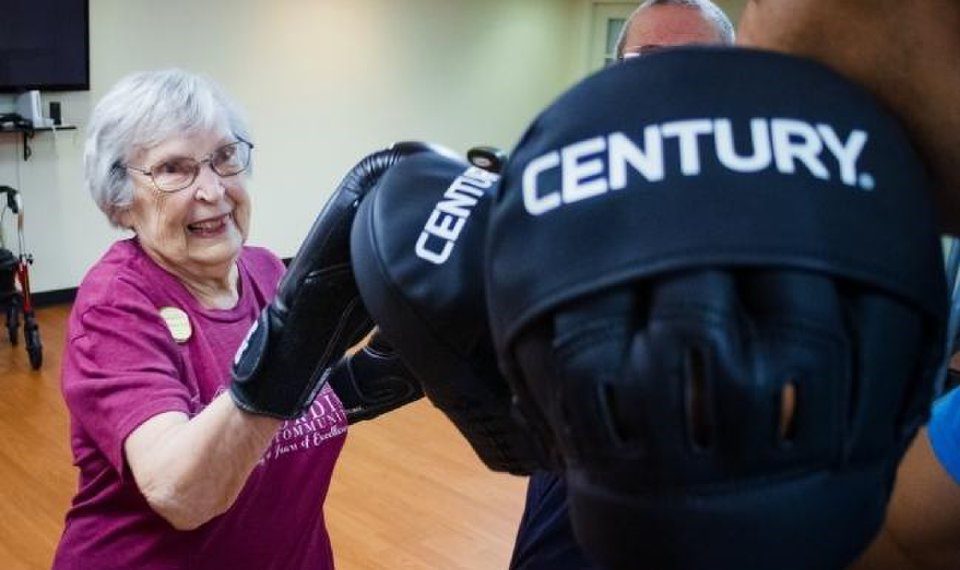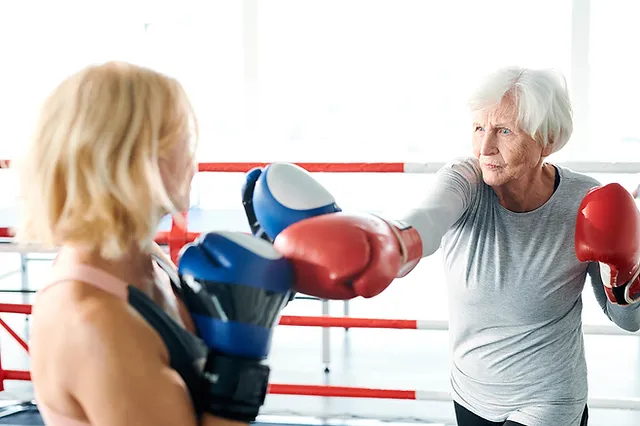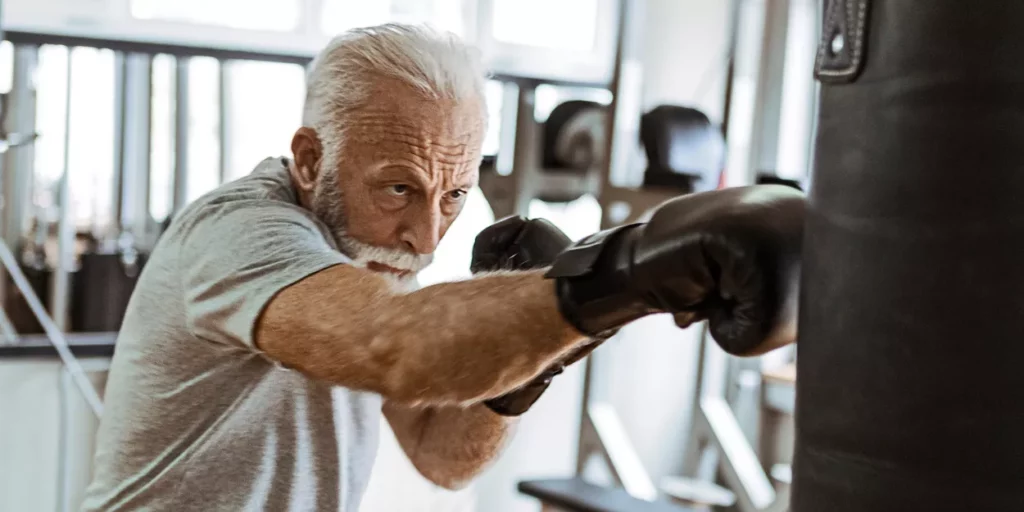Boxing for Seniors: Age is Just a Number
Boxing isn’t just for the young and agile; it’s a sport that can benefit people of all ages. In this article, we will explore the world of boxing for seniors, highlighting its physical, mental, and social advantages. Whether you’re a senior looking for a new fitness routine or you’re simply curious about the benefits of boxing for the older generation, read on to discover why boxing is a knockout choice.

>>>SCHEDULE A BOXING CLASS TODAY !<<<
The Benefits of Boxing for Seniors
Boxing is often associated with intensity and athleticism, but it also offers a wide range of advantages for seniors. From improving physical health to boosting mental well-being, here are some of the reasons why seniors are lacing up their boxing gloves:
Getting Started
Finding the Right Boxing Gym
The first step to embracing boxing as a senior is finding the right gym. Look for facilities that offer senior-friendly classes, experienced trainers, and a supportive atmosphere. Research local options and visit them to get a feel for the environment.
Choosing the Right Gear
Boxing requires some essential gear, including gloves, hand wraps, and appropriate footwear. Ensure you invest in high-quality gear that provides comfort and protection during your workouts.
Warm-Up and Stretching
Importance of Warm-Up
Before diving into the ring, it’s crucial to warm up your body properly. Seniors, in particular, should pay extra attention to this step to prevent injuries. Spend at least 10-15 minutes on light cardio and dynamic stretching.
Stretching Exercises for Seniors
Incorporate static stretches into your routine to improve flexibility and reduce muscle stiffness. These stretches can help with mobility and range of motion, both essential for boxing.
Basic Boxing Techniques
Stance and Footwork
Proper stance and footwork are the foundations of boxing. Learn how to position your body and move your feet to maintain balance and defend yourself effectively.
Jab, Cross, Hook, and Uppercut

>>>SCHEDULE A BOXING CLASS TODAY !<<<
Mastering these fundamental punches is key to becoming a skilled boxer. Start with the basics, and as you progress, you can add more complex combinations to your repertoire.
Safety Measures
Wearing Protective Gear
Safety should always be a top priority. Seniors should wear appropriate protective gear, such as headgear and mouthguards, to reduce the risk of injuries.
Knowing Your Limits
While pushing your boundaries is essential for growth, it’s equally important to know your limits. Listen to your body, and don’t overexert yourself.
Building Strength and Endurance
Cardio Workouts
Boxing is an excellent cardiovascular exercise that can enhance your stamina. Incorporate shadow boxing, bag work, and jump rope into your routine to build endurance.
Strength Training
Strength training exercises are essential for seniors to maintain muscle mass and bone density. Include weightlifting and bodyweight exercises to increase overall strength.
Improving Balance and Coordination
Agility Drills
Agility drills can enhance your reflexes and coordination. Exercises like ladder drills and cone drills are great for improving your footwork.
Balance Exercises
Maintaining balance becomes increasingly crucial with age. Incorporate balance exercises like yoga and stability ball workouts into your routine.
Mental Benefits

>>>SCHEDULE A BOXING CLASS TODAY !<<<
Stress Relief
Boxing is an excellent stress reliever. The physical activity releases endorphins, reducing stress and improving your overall mood.
Increased Confidence
Mastering new techniques and conquering challenges in the ring can boost your self-esteem and confidence levels.
. Social Aspect
Boxing as a Group Activity
Many seniors find joy in the camaraderie of group boxing classes. Sharing the experience with others can make your journey more enjoyable.
Making New Friends
Boxing classes offer an excellent opportunity to connect with like-minded individuals and expand your social circle.
Adjusting for Health Conditions
Boxing for Arthritis
Believe it or not, boxing can be adapted for seniors with arthritis. Consult with your trainer to modify exercises and protect your joints.
Parkinson’s and Boxing
There’s growing evidence that boxing can help improve the symptoms of Parkinson’s disease. Specialized programs cater to individuals with Parkinson’s, focusing on balance, coordination, and strength.
Consistency and Progress
Setting Goals
Establish clear fitness goals to track your progress. Whether it’s weight loss, improved endurance, or enhanced skills, having objectives will keep you motivated.
Tracking Your Progress
Keep a training journal to monitor your achievements and identify areas that need improvement. Celebrate your successes along the way.
Staying Safe
Dealing with Injuries
Injuries can happen, even in non-contact boxing workouts. If you experience an injury, seek medical attention promptly and follow your healthcare provider’s advice.
Listening to Your Body
Always pay attention to any discomfort or pain during workouts. Rest when necessary and don’t push through pain, as this can lead to more severe injuries.
Testimonials
Success Stories of Senior Boxers
Read inspiring stories of seniors who have transformed their lives through boxing. Their journeys demonstrate the incredible potential of this sport.
Frequently Asked Questions
Can seniors start boxing even if they’ve never done it before?
Absolutely! Boxing is accessible to seniors of all experience levels. Start at your own pace and gradually work your way up.
Is boxing safe for seniors with pre-existing medical conditions?
Boxing can be adapted to accommodate various health conditions. Consult with your healthcare provider and boxing trainer for personalized recommendations.
How often should seniors train in boxing?
The frequency of training varies from person to person. Aim for at least two to three sessions per week to see noticeable improvements.
Are there age limits to start boxing?
No, there are no strict age limits to start boxing. Seniors can begin at any age, as long as they are in good health and follow proper precautions.
Can boxing help with Parkinson’s disease?
Yes, boxing has shown promise in improving the symptoms of Parkinson’s disease. Seek out specialized programs designed for individuals with Parkinson’s for the best results.
Conclusion
Age is just a number in boxing. Seniors can reap numerous physical, mental, and social benefits by embracing this challenging yet rewarding sport. With the right guidance, gear, and mindset, boxing can become a lifelong passion that keeps you fit, agile, and confident. So, put on those gloves and start your boxing journey today!

